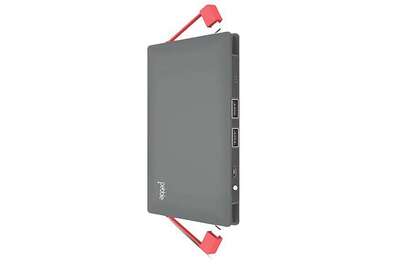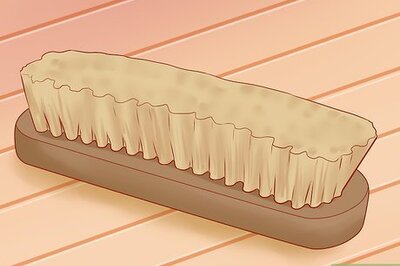
views
Exercising Without Weights

Exercise your biceps by doing a set of chin-ups. Find a pull-up bar and stand underneath it, grabbing the bar with both hands. Your palms should be facing towards you. Slowly pull yourself up until your chin is even with the bar then lower yourself back down, repeating ten times. Don't touch the floor or jump otherwise the exercise won't be as effective. If you have trouble completing the set try standing on a chair and lightly supporting yourself with your legs as you do the exercise. Make sure the chin-up bar is properly installed or it will fall and you'll hurt yourself!

Exercise your shoulders by doing some elevated pushups. Elevate your feet on a chair, exercise ball, or box and do ten pushups, or a set. Make sure to keep your back and your legs straight or you may injure yourself.

Exercise your triceps by doing a set of bench dips. Find a bench and sit on it with your palms against the bench on either side of your torso and your legs extended. Slowly lower yourself off the bench using your arms. Straighten your arms, lifting your entire body, and lower yourself back down by bending your arms. Don't touch the ground or use your legs to help you complete the exercise or it will be less effective.
Exercising Your Arms With Weights

Start with lighter weights and work your way up to heavier weights over time. When you choose a weight for an exercise it should be heavy enough to make the exercise effective but not so heavy that you can't lift it. If you find yourself having trouble repeating a set (the number of repetitions of an exercise) choose a lighter weight and keep going! If you use a weight that is too heavy you run the risk of injuring yourself.

Work out your biceps. Your biceps are commonly referred to as the “big” part of your upper arm. This isn't the only part of your arm that you have to work out to get big arms but it's definitely an important part! Do a set of bicep curls. Choose some weights that are heavy but not too heavy to lift several times. Sit on a bench and lean forward, placing your elbow close to your knee. Holding the barbell, extend your arm until your forearm is parallel to the floor, elbow still resting on your knee, and pull the barbell towards your chest. Repeat this step ten times to do a set.

Work out your shoulders. Any person with large arms will also have large shoulders. This is an important part of having large arms that many people forget about. Make sure when exercising your shoulders that you keep your back straight to avoid injury! Do a set of palms-in shoulder presses. Choose a pair of weights that are heavy but not too heavy for you. Stand up straight and lift your arms above your head at a ninety degree angle. Slowly straighten your arms while holding the dumbbells to exercise your shoulders. Repeat this step ten times to complete a set.

Work out your triceps, or the underside of your upper arms. These muscles are very important and are often overlooked in favor of bicep exercises. However, these muscles can make your biceps look even bigger! Do two sets of one arm overhead extensions, or one for each arm. Choose a dumbbell that's moderately heavy for you. Lean forward slightly, keeping your back straight and your knees slightly bent, and lift the dumbbell behind you with your arm slightly bent. Extend your arm until it's straight and then return it to the original position. Repeat this process ten times for a set and do it once for each arm.

Work out other parts of your body. A person with very muscular arms and small legs looks very strange. Make sure to exercise other parts of your body regularly as well, including your legs, back, and chest. Many people find it useful to have certain days where they work out different body groups. For example, Monday and Thursday can be "arm day," Tuesday and Friday can be "leg day," and Wednesday and Saturday can be "back and chest day". Give yourself at least one day a week where you rest. Your muscles need time to heal if they're going to grow as big as you want them to.
Eating a Muscle-Building Diet

Eat the right foods for your goals. If you want to build a lot of muscle, you need to eat a lot of protein. Studies have shown that people who eat protein gain muscle faster than those who don't. The reason is simple; your body uses protein to build muscle. The more protein you give your body, the more muscle you can build. If you're just beginning a workout routine, it's very important to get enough protein if you want to see fast results. For every pound of body weight you have, you need to eat .73 grams (0.026 oz) of protein. For example, a 180 pound man would need to eat 130 grams (4.6 oz) of protein every day. It's best to evenly split your protein intake over three meals so that your body absorbs it properly; so, if you needed 120 grams (4.2 oz) of protein a day, you would eat about 40 grams (1 oz) of protein with each meal.

Find high-protein foods to eat. Think about what foods you like. How many of them are high in protein? For example, lean beef is an excellent source of protein. In a four ounce serving of lean ground beef there are 29 grams (1 oz) of protein. If you like lean beef, try to incorporate this into your diet more often. If you don't eat meat, quinoa is also an excellent source of protein, with eight grams of protein per cup serving. Other good sources of protein include beets, eggs, brown rice, Greek yogurt, and chicken. Don't eat too much of the same thing; try to vary your diet so that you stay healthy.

Eat a lot of healthy food. If you're trying to build muscle, you need to give your body the tools it needs to build that muscle. That means that you'll be eating a lot more calories than you're used to eating. To find out how many calories you need, multiply your body weight by twenty. For example, a 180 pound man needs to eat 3,600 calories per day to gain muscle. Make sure you're working out hard in the gym! If you eat over 2,000 calories a day without any exercise you could gain fat instead of muscle. Stay away from sugary and fatty food! Get most of your calories from meats, vegetables, grains, and fruits by eating a balanced diet.
Using Protein Powder

Drink protein shakes. If you're worried about getting enough protein in your diet it's a good idea to start using protein powder. Protein powder is a food product that is mixed with a liquid to form a protein shake and can be found at many grocery stores or online. You can choose to drink your protein shake with either milk or water; milk provides more protein but water provides less calories. There are three kinds of protein powders: whey, casein, and soy. Whey powder is the most common kind of protein powder. It's made from milk proteins, readily available, and mixes easily into water or milk. Casein powder is also made from dairy products and is absorbed into the body more slowly than whey. This can result in a steadier supply of protein to your body than whey could give alone. Because of this, some experts recommend combining the two proteins. Soy powder is also a good source of protein. It's harder to blend with water but there are no dairy proteins in the mixture. This is a good option for vegans and people who are lactose intolerant.

Buy the right protein powder. Expensive protein powders aren't always better. Make sure to read the nutrition facts on the containers of several protein powders before you make your choice. If you aren't a professional athlete, the less expensive protein powders will serve just as well for you without breaking the bank!

Drink your protein shake immediately following your workout. The more you work out, the better your body will metabolize proteins. You want to make sure your body has the building blocks it needs to create the muscles that you want! To make sure they drink their protein shake at the right time, many people will bring the shake with them to the gym and drink it while they cool off. If your gym doesn't have a cooler to keep a shake made with milk in while you work out, bring a bottle filled with only powder and add water to the bottle after your workout. Then you can still have your protein shake at the optimal time without worrying about spoiled milk!


















Comments
0 comment